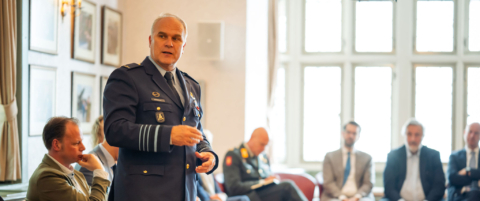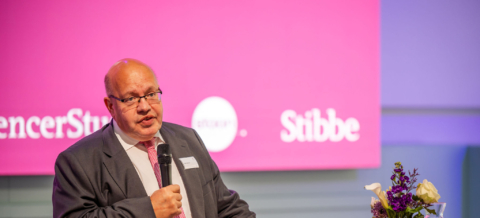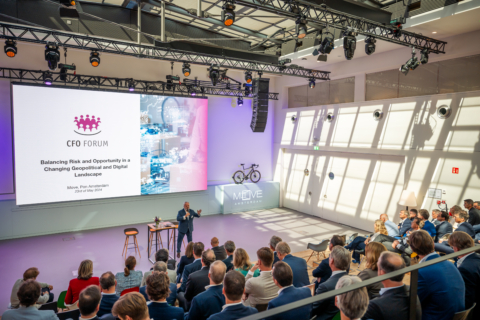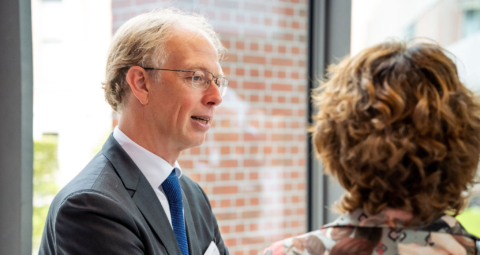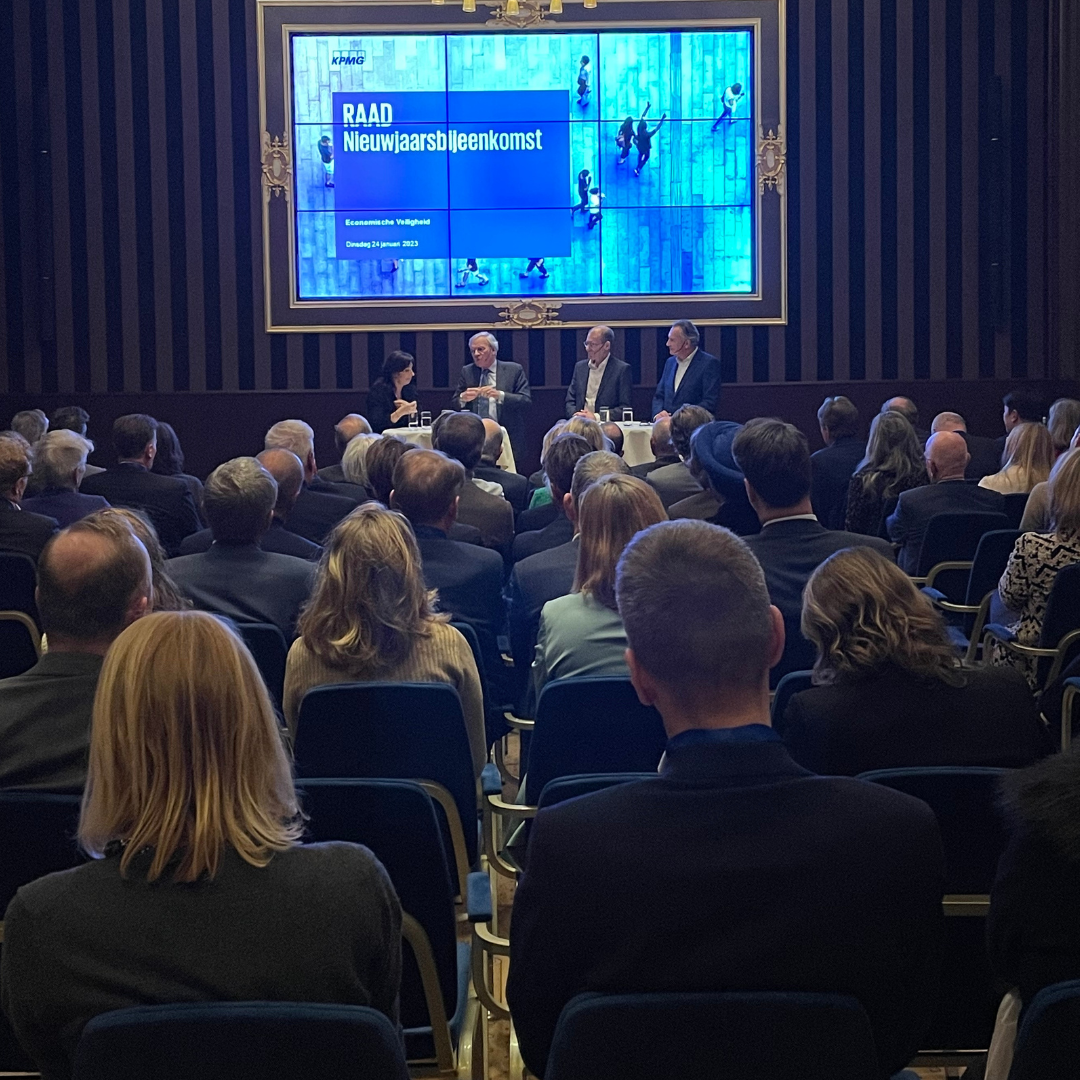
This article was published in Dutch by the KPMG RAAD Board Program on February 9, 2023. It has been translated using AI technology, the original article can be found here.
Economic security: Europe must set its own agenda
KPMG RAAD New Year’s Meeting
The great economic connection between companies offers opportunities; there are also plenty of challenges currently. Take the geopolitical storm, which concerns not only European government leaders but also the Dutch business community. During the KPMG RAAD New Year’s Meeting, Jaap de Hoop Scheffer (Minister of State), Menno Snel (Chair Element NL) and Robert-Jan Smits (President TU Eindhoven) shared with attendees how to address it.
‘Geopolitics has definitely entered the boardroom by 2023,’ observes Stephanie Hottenhuis, chair of the board at KPMG NL. ‘The business community is becoming increasingly aware that the highly connected global economy offers opportunities. At the same time, it creates vulnerabilities and threats.’ The need for knowledge about these challenges is great. That is why KPMG RAAD organized an inspiring New Year’s Meeting for top executives, supervisory directors and NextGen.
Two superpowers
‘Forget the image of THE superpower you grew up with,’ Jaap de Hoop Scheffer emphasized. There are now two superpowers – the United States and China – on the main stage, according to the Minister of State and Emeritus Professor of International Relations & Diplomatic Practice. That insight is crucial to make sense of developments in the global economy. ‘In Europe, we have to position ourselves between the U.S. on the one hand and China on the other.’ The NATO alliance with America provides security guarantees – certainly around the war in Ukraine – but recent U.S. policy against China, according to De Hoop Scheffer, in turn creates risk. Should we follow the Americans in this, or not? The Netherlands is in the eye of that storm with semiconductor machine manufacturer ASML. Not following the ally could lead to tension in transatlantic relations, De Hoop Scheffer sees.
Geopolitical storm
It is a geopolitical storm in which not only European government leaders but also the business community finds themselves. Stephanie Hottenhuis (KPMG NL) witnesses daily how geopolitics has penetrated boardrooms. ‘This affects all parts within companies; the products and services, the supply chain and also the partnerships.’ The energy crisis puts this further on edge. High prices threaten de-industrialization in Europe. ‘Industrial companies are tempted by the high energy prices in Europe to relocate their production. To the United States or China, for example, where energy is much cheaper.’
Slowbalisation
Companies benefit from an European industrial policy, speakers Menno Snel (Element NL) and Robert-Jan Smits (TU Eindhoven) see in addition to De Hoop Scheffer. The two superpowers are making their own plan, that much is clear. The recent introduction of the American Inflation Reduction Act (IRA) confirms this once again, Snel explains. The former finance secretary outlines how the IRA makes it more advantageous for European companies to invest in the United States. IRA includes about USD 369 billion (about EUR 338) in subsidies for the development of sustainable technologies. ‘Biden is doing everything he can to convince companies and investors that America is the green continent.’ Such nationally focused measures affect global trade. ‘There is a reason that the IMF recently introduced the term slowbalisation. A reference to declining economic globalization.’
A joint support plan within the European Union can counterbalance the American billions in subsidies. Much more difficult to organize, Snel knows. Already France, Spain and Germany are looking at the possibilities. ‘We have many rules in Europe that make it difficult to give a Dutch company priority over a foreign competitor. The Americans have no problem with that. As an economist, I am in favor of free trade, but I believe that the energy transition we are in will benefit from a government that encourages innovative companies.’
Knowledge in the world
‘The last thing we need is a subsidy war between Europe and the US,’ says Robert-Jan Smits. The president of TU Eindhoven calls fear a poor motivator. ‘We do need more cooperation, otherwise Europe cannot move forward.’ He is convinced of Europe’s strength. ‘With 7% of the world’s population, we still generate 1/3 of the world’s knowledge. Our European greentechs are ahead of the Americans. Let us cherish our own strengths. Within Europe, the Netherlands is in good shape as a knowledge country. Everything is there: well-educated people, strong companies and good entrepreneurship.’
Lazy companies
Important that the rules do not hinder growth, Smits believes. In 2019, Brussels put a stop to the proposed takeover of French train builder Alstom by German industrial group Siemens. ‘An unthinkable decision in the current times, the competition rules are clearly no longer adequate.’ The pandemic has put the strategic discussion of the manufacturing industry in perspective in that area as well. ‘Remember that 80% of chip production has disappeared to the East over the past 30 years. The question now is how to bring some of that back.’
But doesn’t state aid – in any form – then make companies lazy, as is often thought? According to Snel, that calls for a targeted approach that offers protection not at the company level but at the market level. The current European CO2 tax is a best practice. ‘We have determined that every party that wants to put a product on the European market that European companies themselves offer must pay the same kind of tax. That’s how you keep a level playing field.’
Green industry policy
So European cooperation has many advantages. But what exactly should be on the agenda? The coalition agreement describing green industrial policy two years ago offers inspiration. ‘With a clear strategy, we stimulate a manufacturing industry that leads the way,’ Snel quotes. So much for theory; in practice, tax increases and the need to reduce CO2 hit the manufacturing industry. According to the three speakers, this industrial policy could be more concrete. The good news: the means are there. The Climate Fund and the Transition Fund can help realize the ambitions of green industry policy and make industry in the Netherlands more sustainable. According to Smits, we can take an example from the US when it comes to implementation. ‘The IRA is fast, efficient and simple. Decision-making takes too long both in Europe and the Netherlands.’ De Hoop Scheffer also sees opportunities, for example by stimulating the various technology regions in Wageningen, Groningen and Eindhoven. The infrastructure does require improvement. ‘It is remarkable that it still takes me just as long to ride the train to Groningen as it did 50 years ago.’
Strategic autonomy
The importance of manufacturing gets support from the audience. One of the participants is curious how it manages to bridge the gap in energy costs. ‘Unlike the Americans, we in Europe are not self-sufficient. Can we solve it without investing heavily in nuclear power?’ Snel sees solutions in green industrial policy. ‘Think of the further development of hydrogen. Moreover, that is in line with a policy aimed at strategic autonomy. We did learn that from our dependence on Russian gas. There is no easy solution for now, but all our policies should be aimed at long-term autonomy.’
Embracing businesses
In the audience, a participant wonders if the cabinet should not put a little more focus in industrial policy. ‘Determine which sectors you want to embrace and retain. You can see that people in Germany and France express certain preferences. Should we do that more?’ Smits sees advantages in targeted and longer-term support for the manufacturing industry, for example. He quotes Professor Mariana Mazzucato who argues that governments should not fix markets, but create markets. “We have to choose, but not for a specific technology, sector or company,” Snel says. An example of a successful sector-neutral approach is the successful introduction of electric driving. ‘At the time, the cabinet determined: from 2030 onwards, we will no longer sell new non-electric cars in the Netherlands. That gave confidence to investors in the car and charging station industry. As a result, electric driving was introduced in the Netherlands much faster than in other countries in Europe.’
New generations keep us on our toes
What is clear is that the geopolitical challenges require concrete choices from government and business. Snel sees that the government can support business by simplifying and speeding up processes. For example, around permits. ‘Obtaining the right permit sometimes takes years, we also saw that with Invest-NL. We may be used to those processes from the polder system, but that is no longer of our time.’ De Hoop Scheffer likes to give a lot of room to new generations who are very entrepreneurial and can make a difference. ‘They keep us sharp and are monitoring us.’ Smits concurs: ‘When I see the students at our knowledge institutions, I have confidence in the future.’ But Snel wants the participants to be careful not to place much-needed change solely on the shoulders of the new generation. ‘Let everyone of all generations look at what they can do right now.’
